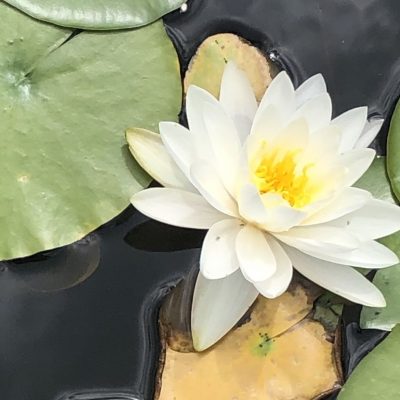
“When you recite a mantra, you make yourself positive, pure, and your vibration is penetrating.” ~ Yogi Bhajan
I remember the first time I experienced the power of mantra.
My husband and I were headed for a retreat that was canceled at the last minute. Eager to get away, we randomly (or was it?) signed up for something called Ecstatic Chant.
There we were immersed in mantra through Kirtan, a yogic tradition in which mantras are chanted to music.
During the Kirtan, I glimpsed what yogis call Ananda, a state of bliss, happiness, and oneness. It was incredibly powerful, so much so that I can still feel the experience in my being. At that moment, I also felt self-love, something I’d been seeking for a long while.
Are you seeking this too?
If you are, mantra meditation may be the answer. I’ve used the power of mantra to heal myself and recommended mantra to help others. A mantra is a word, sound, or phrase, repeated with an intention to bring forth a state of centered awareness and peace within oneself. Mantra can be said silently, aloud, or chanted. Many wisdom traditions use mantras, including Hindu, Jain, Buddhist, and Judeo-Christian.
Mantras, Vibration, and Meaning:
One of the powerful things about mantras is that they connect to a vibration that many consider sacred. It’s hard to describe exactly how this feels—which is why you should try it—but I like to think of it as harmonizing with the Divine. You literally feel the vibration deep within your body as you repeat these sacred phrases.
While mantra is vibration, it is also meaning. In the repetition, we are affirming ourselves as loving and loved. Thus mantras are powerful in promoting self-love and compassion. This is especially important if you have struggled with things such as addiction or self-harm.
In some wisdom traditions, mantras are chanted 108 times—a number considered significant. You can use Malas, a string containing 108 beads, to help keep count.
Here are 6 Mantras to Increase Self-Love:
I have found these mantras to be especially helpful in supporting self-love. Set aside some time daily. Notice how the seeds of self-love are planted and flourish.
So Hum
This is a classic Sanskrit (Hindu) mantra. So Hum means “I am” or “I am enough.” When we chant So Hum, we balance the Root Chakra (or Muladhara). This is a way to ground in self-love and the idea that we are abundant.
Yam (pronounced “yum,” like your yummy self)
Repeating this simple word opens the heart chakra (Anahata), which is connected to love and kindness. Repeat Yam to activate the healing within yourself and increase your ability to experience the love of self and connect to loving others.
Aham Prema
This is one of my favorite mantras, and translates as “I am love.” It evokes the highest love that lives within us. Chanting this mantra helps us bring forth this love in every relationship we have, including ourselves.
Shanti Hum
This one has a similar meaning. Shanti, peace, and love can be chanted by themselves. Combined as the mantra Shanti Hum, it can be translated as “I am peace and love.” This affirms our self as a reflection of the kind of pure love found within the Divine.
Ahava Rabbah
This mantra comes from Jewish wisdom traditions. This Hebrew mantra reminds us that all beings are sacred and touched by Divine love. Chant this to remind yourself that you are created within the Divine’s image—and as such are perfect as you are.
Lokah Samastah Sukhino Bhavantu
This is a reminder of all beings’ inner connectedness and the contributions you make toward the good of all. The literal translation is:
“May all beings be happy and free, and may the thoughts, words, and actions of my own life contribute in some way to that happiness and freedom for all.”
This shifts us away from our own (often negative) thoughts and reminds us that we are a force of good for others.
May you know great peace, self-love, and self-compassion in repeating these mantras.
Ready to join?
Hey, thanks so much for reading! Elephant offers 1 article every month for free.
If you want more, grab a subscription for unlimited reads for $5/year (normally, it's $108/year, and the discount ends soon).
And clearly you appreciate mindfulness with a sense of humor and integrity! Why not join the Elephant community, become an Elephriend?
Your investment will help Elephant Journal invest in our editors and writers who promote your values to create the change you want to see in your world!
Already have an account? Log in.
Ready to join?
Hey, thanks so much for reading! Elephant offers 1 article every month for free.
If you want more, grab a subscription for unlimited reads for $5/year (normally, it's $108/year, and the discount ends soon).
And clearly you appreciate mindfulness with a sense of humor and integrity! Why not join the Elephant community, become an Elephriend?
Your investment will help Elephant Journal invest in our editors and writers who promote your values to create the change you want to see in your world!
Already have an account? Log in.
 Share on bsky
Share on bsky





Read 8 comments and reply